外研版 八年级上 Module 5 Unit 3 Language in use. 课件 (共28张PPT)
文档属性
| 名称 | 外研版 八年级上 Module 5 Unit 3 Language in use. 课件 (共28张PPT) | 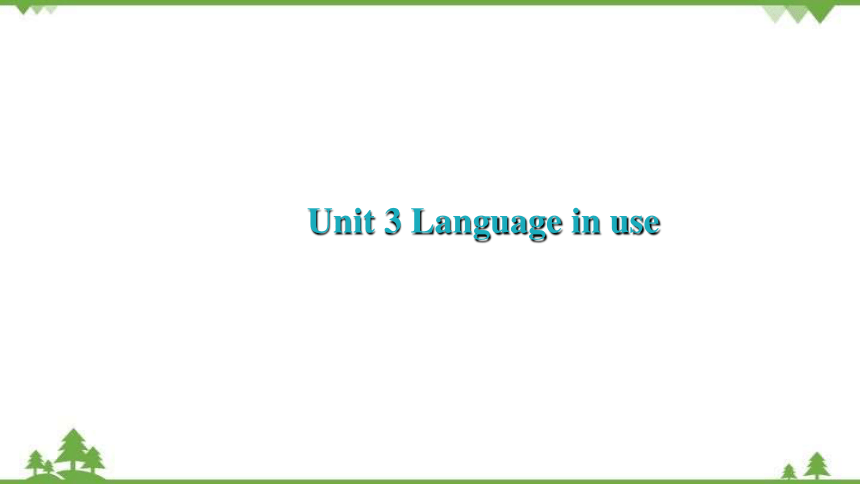 | |
| 格式 | ppt | ||
| 文件大小 | 150.0KB | ||
| 资源类型 | 教案 | ||
| 版本资源 | 外研版 | ||
| 科目 | 英语 | ||
| 更新时间 | 2022-07-19 11:27:06 | ||
图片预览


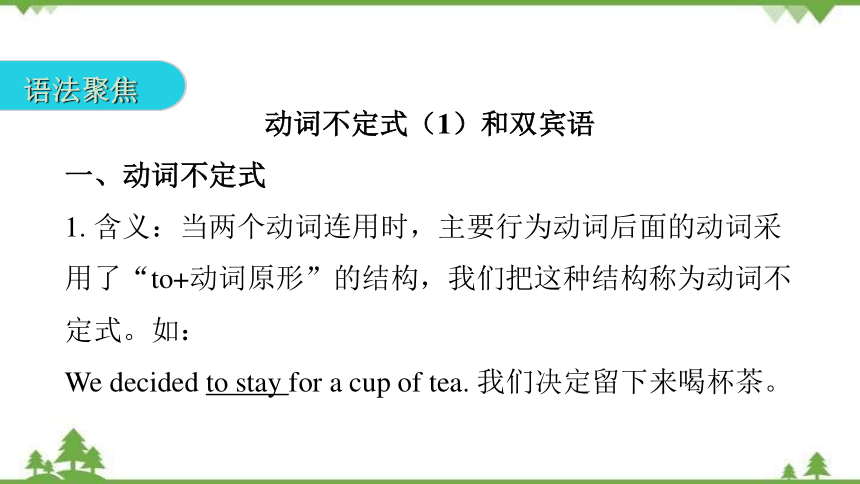
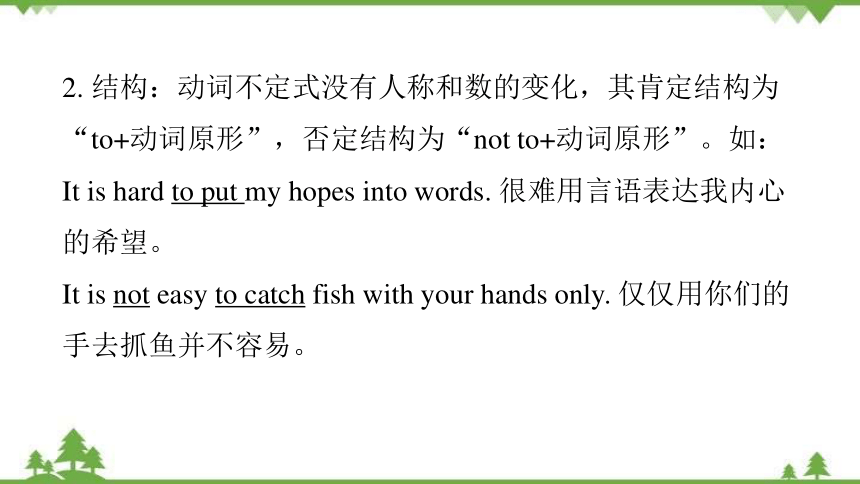
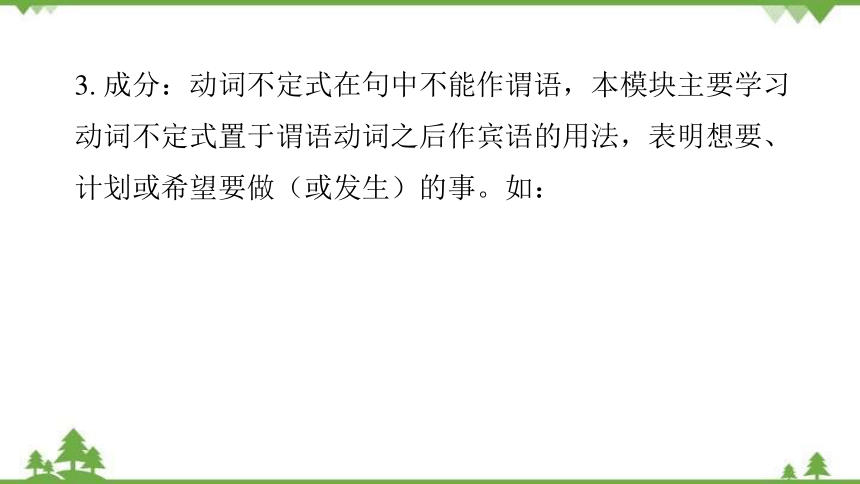

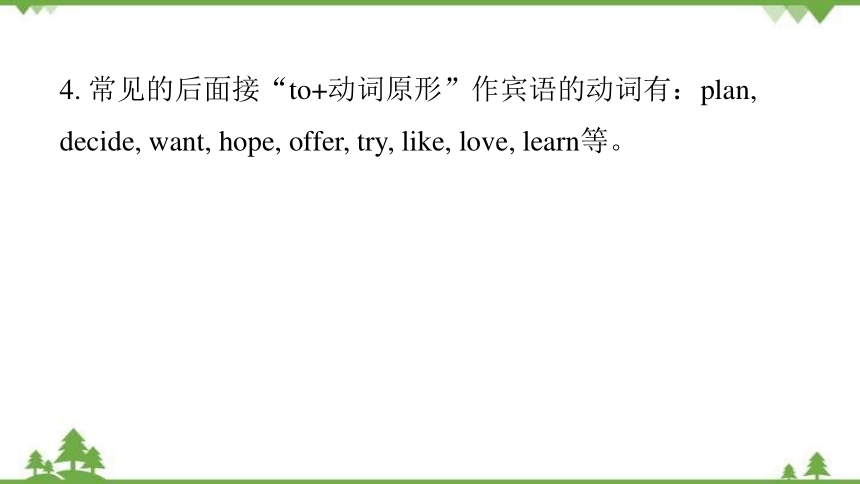

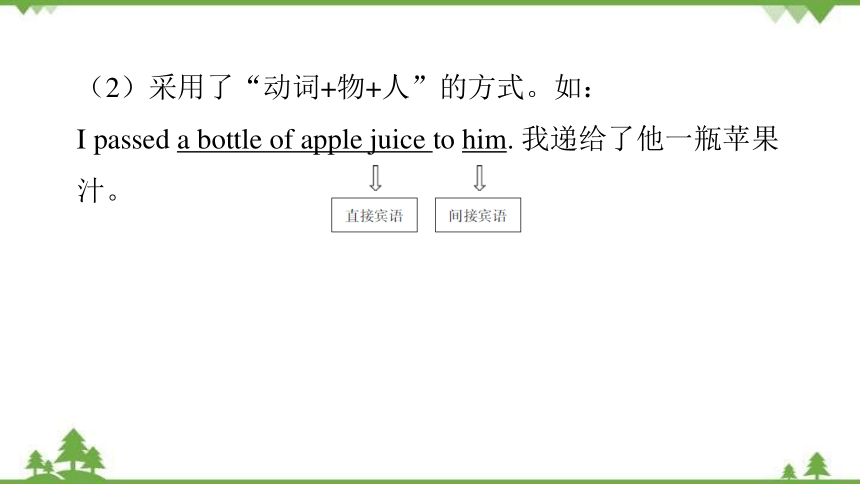
文档简介
(共28张PPT)
Unit 3 Language in use
目录
语法聚焦
01
课堂小测
02
课后作业
03
语法聚焦
动词不定式(1)和双宾语
一、动词不定式
1. 含义:当两个动词连用时,主要行为动词后面的动词采用了“to+动词原形”的结构,我们把这种结构称为动词不定式。如:
We decided to stay for a cup of tea. 我们决定留下来喝杯茶。
2. 结构:动词不定式没有人称和数的变化,其肯定结构为“to+动词原形”,否定结构为“not to+动词原形”。如:It is hard to put my hopes into words. 很难用言语表达我内心的希望。
It is not easy to catch fish with your hands only. 仅仅用你们的手去抓鱼并不容易。
3. 成分:动词不定式在句中不能作谓语,本模块主要学习动词不定式置于谓语动词之后作宾语的用法,表明想要、计划或希望要做(或发生)的事。如:
You know, I wanted to see the Beijing Opera, so Lingling offered to take me there. 你看,我想看京剧,所以玲玲就主动带我去那儿了。
We only planned to watch for an hour. 我们原先只打算看一个小时。
I hope to understand more next time. 我希望下次能懂得多一些。
4. 常见的后面接“to+动词原形”作宾语的动词有:plan, decide, want, hope, offer, try, like, love, learn等。
二、双宾语
1. 当我们表达“给某人某物”时就出现了两个动作的承受者,一个是物,一个是人。它们在英语中的排列顺序为:(1)采用了“动词+人+物”的表达方式。如:
I passed him a bottle of apple juice. 我递给了他一瓶苹果汁。
(2)采用了“动词+物+人”的方式。如:
I passed a bottle of apple juice to him. 我递给了他一瓶苹果汁。
2. 可以接双宾语的动词很多,常见的有:give, bring, pass, send, show, leave, buy, tell, teach, sell等。如:
My brother bought me some storybooks. 我哥哥给我买了一些故事书。
Who teaches you English 谁教你(们)英语?
注意:双宾语结构为“动词+物+人”时,间接宾语(人)前要加入适当的介词to或for。
(1)后接介词to的动词有:give, show, pass, lend, take, tell 等; to意为“给某人”,意为某人接受或收到了某物。
give sb.sth.=give sth. to sb.
bring sb.sth.=bring sth. to sb.
lend sb.sth.=lend sth. to sb.
hand sb.sth.=hand sth. to sb.
send sb.sth.=send sth. to sb.
show sb.sth.=show sth. to sb.
leave sb.sth.=leave sth. to sb.
teach sb.sth.=teach sth. to sb.
(2)后接介词for的动词有:buy, make, cook, get等,for意为“为某人”。
buy sb.sth.=buy sth. for sb.
make sb.sth.=make sth. for sb.
cook sb.sth.=cook sth. for sb.
get sb.sth.=get sth. for sb.
课堂小测
describe
ffers
一、根据中文意思或首字母提示,用单词的适当形式填空,每空一词
1.Mr Liu is very kind and always o________ to help others.
2. Please use five sentences to_________________ (描写) your perfect holiday.
college
ovel
society
3. Everyone has a chance to get a good education and go to_________________ (大学).
4. You will meet many new words while you are reading this English n________.
5. The story tells us something about Chinese_________________ (社会).
not
to
二、句型转换
6.My father asked me to finish the homework first.(改为否定句)
My father asked me_________________ ________________ finish the homework first.
7. The hostess offered me a cup of coffee. (改为同义句)
The hostess_________________ a cup of coffee________ me.
to
offered
buys
for
gave
8. Miss Liu often buys her students some storybooks.(改为同义句)
Miss Liu often_________________ some storybooks________ her students.
9. Lucy gave Jingjing an apple. (改为同义句)
Lucy_________________ an apple_______________ Jingjing.
10.We decided that we should stay there.(改为同义句)
We decided_________________ _________________ there.
to
stay
to
C
三、单项填空
( )11. Do you want_________________ something for the disabled
children
A. do B. doing
C. to do D. did
A
( )12. He advised me_________________ a new computer.
A. to buy B. buy
C. buying D. bought
C
( )13. Don’t make children_________________ too much
homework.
A. doing B. to do
C. do D. did
C
( )14. I heard you bought a new MP4. Can you_________________
A. show me it B. show it for me
C. show it to me D. show it me
( )15. Did they decided_________________ the job _________________ Joe
A. offer; in B. to offer; with
C. to offer; to D. offer; to
C
四、语法选择 (核心素养:文化意识)
Lao She wrote Teahouse in 1957. The play shows the audience(观众) the 16 of common people in China between 1898 and 1945. It takes place in 17 teahouse in old Beijing and it tells us the story of Wang Lifa and his customers. It asks us 18 the teahouse as the centre of the neighbourhood. Finally, it says goodbye to old Beijing and 19 people.
The story starts in 1898 during the Qing Dynasty. It continues in 1916, and finally, it brings the audience to the end of the Anti-Japanese War in 1945. 20 the war, Wang lost the teahouse and he died.
Lao She was born in Beijing in 1899. His mother sent him to a teacher’s school in Beijing and he learned to teach. 21 1924 to 1929 he taught Chinese in London. He wrote many plays, novels and short stories. He 22 named “the People’s Artist” and “the Great Master of Language”. He was one of 23 Chinese writers of the 20th century.
At Lao She Teahouse today, waiters bring tea to the customers and sell them delicious Chinese food. If you like Beijing Opera, folk music, acrobatics (杂技) or magic shows, you 24 enjoy them in the teahouse. Lao She Teahouse gives a 25 welcome to everyone from all over the world.
( )16. A. live B. life C. lives D. living
( )17. A. / B. the C. a D. an
( )18. A. see B. saw C. to see D. seeing
( )19. A. its B. it’s C. it D. itself
( )20. A. Before B. Until C. Since D. After
C
C
C
A
D
( )21. A. Between B. From C. Among D. During
( )22. A. is B. was C. are D. were
( )23. A. great B. greater
C. greatest D. the greatest
( )24. A. can B. must C. should D. need
( )25. A. warmly B. warm
C. warmer D. warmest
B
B
D
A
B
Unit 3 Language in use
目录
语法聚焦
01
课堂小测
02
课后作业
03
语法聚焦
动词不定式(1)和双宾语
一、动词不定式
1. 含义:当两个动词连用时,主要行为动词后面的动词采用了“to+动词原形”的结构,我们把这种结构称为动词不定式。如:
We decided to stay for a cup of tea. 我们决定留下来喝杯茶。
2. 结构:动词不定式没有人称和数的变化,其肯定结构为“to+动词原形”,否定结构为“not to+动词原形”。如:It is hard to put my hopes into words. 很难用言语表达我内心的希望。
It is not easy to catch fish with your hands only. 仅仅用你们的手去抓鱼并不容易。
3. 成分:动词不定式在句中不能作谓语,本模块主要学习动词不定式置于谓语动词之后作宾语的用法,表明想要、计划或希望要做(或发生)的事。如:
You know, I wanted to see the Beijing Opera, so Lingling offered to take me there. 你看,我想看京剧,所以玲玲就主动带我去那儿了。
We only planned to watch for an hour. 我们原先只打算看一个小时。
I hope to understand more next time. 我希望下次能懂得多一些。
4. 常见的后面接“to+动词原形”作宾语的动词有:plan, decide, want, hope, offer, try, like, love, learn等。
二、双宾语
1. 当我们表达“给某人某物”时就出现了两个动作的承受者,一个是物,一个是人。它们在英语中的排列顺序为:(1)采用了“动词+人+物”的表达方式。如:
I passed him a bottle of apple juice. 我递给了他一瓶苹果汁。
(2)采用了“动词+物+人”的方式。如:
I passed a bottle of apple juice to him. 我递给了他一瓶苹果汁。
2. 可以接双宾语的动词很多,常见的有:give, bring, pass, send, show, leave, buy, tell, teach, sell等。如:
My brother bought me some storybooks. 我哥哥给我买了一些故事书。
Who teaches you English 谁教你(们)英语?
注意:双宾语结构为“动词+物+人”时,间接宾语(人)前要加入适当的介词to或for。
(1)后接介词to的动词有:give, show, pass, lend, take, tell 等; to意为“给某人”,意为某人接受或收到了某物。
give sb.sth.=give sth. to sb.
bring sb.sth.=bring sth. to sb.
lend sb.sth.=lend sth. to sb.
hand sb.sth.=hand sth. to sb.
send sb.sth.=send sth. to sb.
show sb.sth.=show sth. to sb.
leave sb.sth.=leave sth. to sb.
teach sb.sth.=teach sth. to sb.
(2)后接介词for的动词有:buy, make, cook, get等,for意为“为某人”。
buy sb.sth.=buy sth. for sb.
make sb.sth.=make sth. for sb.
cook sb.sth.=cook sth. for sb.
get sb.sth.=get sth. for sb.
课堂小测
describe
ffers
一、根据中文意思或首字母提示,用单词的适当形式填空,每空一词
1.Mr Liu is very kind and always o________ to help others.
2. Please use five sentences to_________________ (描写) your perfect holiday.
college
ovel
society
3. Everyone has a chance to get a good education and go to_________________ (大学).
4. You will meet many new words while you are reading this English n________.
5. The story tells us something about Chinese_________________ (社会).
not
to
二、句型转换
6.My father asked me to finish the homework first.(改为否定句)
My father asked me_________________ ________________ finish the homework first.
7. The hostess offered me a cup of coffee. (改为同义句)
The hostess_________________ a cup of coffee________ me.
to
offered
buys
for
gave
8. Miss Liu often buys her students some storybooks.(改为同义句)
Miss Liu often_________________ some storybooks________ her students.
9. Lucy gave Jingjing an apple. (改为同义句)
Lucy_________________ an apple_______________ Jingjing.
10.We decided that we should stay there.(改为同义句)
We decided_________________ _________________ there.
to
stay
to
C
三、单项填空
( )11. Do you want_________________ something for the disabled
children
A. do B. doing
C. to do D. did
A
( )12. He advised me_________________ a new computer.
A. to buy B. buy
C. buying D. bought
C
( )13. Don’t make children_________________ too much
homework.
A. doing B. to do
C. do D. did
C
( )14. I heard you bought a new MP4. Can you_________________
A. show me it B. show it for me
C. show it to me D. show it me
( )15. Did they decided_________________ the job _________________ Joe
A. offer; in B. to offer; with
C. to offer; to D. offer; to
C
四、语法选择 (核心素养:文化意识)
Lao She wrote Teahouse in 1957. The play shows the audience(观众) the 16 of common people in China between 1898 and 1945. It takes place in 17 teahouse in old Beijing and it tells us the story of Wang Lifa and his customers. It asks us 18 the teahouse as the centre of the neighbourhood. Finally, it says goodbye to old Beijing and 19 people.
The story starts in 1898 during the Qing Dynasty. It continues in 1916, and finally, it brings the audience to the end of the Anti-Japanese War in 1945. 20 the war, Wang lost the teahouse and he died.
Lao She was born in Beijing in 1899. His mother sent him to a teacher’s school in Beijing and he learned to teach. 21 1924 to 1929 he taught Chinese in London. He wrote many plays, novels and short stories. He 22 named “the People’s Artist” and “the Great Master of Language”. He was one of 23 Chinese writers of the 20th century.
At Lao She Teahouse today, waiters bring tea to the customers and sell them delicious Chinese food. If you like Beijing Opera, folk music, acrobatics (杂技) or magic shows, you 24 enjoy them in the teahouse. Lao She Teahouse gives a 25 welcome to everyone from all over the world.
( )16. A. live B. life C. lives D. living
( )17. A. / B. the C. a D. an
( )18. A. see B. saw C. to see D. seeing
( )19. A. its B. it’s C. it D. itself
( )20. A. Before B. Until C. Since D. After
C
C
C
A
D
( )21. A. Between B. From C. Among D. During
( )22. A. is B. was C. are D. were
( )23. A. great B. greater
C. greatest D. the greatest
( )24. A. can B. must C. should D. need
( )25. A. warmly B. warm
C. warmer D. warmest
B
B
D
A
B
同课章节目录
- Module 1 How to learn English
- Unit 1 Let's try to speak English as much as possi
- Unit 2 You should smile at her.
- Unit 3 Language in use .
- Module 2 My home town and my country
- Unit 1 It's taller than many other buildings.
- Unit 2 Cambridge is a beautiful city in the east o
- Unit 3 Language in use .
- Module 3 Sports.
- Unit 1 Nothing is more exciting than playing tenni
- Unit 2 This year we training more carefully.
- Unit 3 Language in use .
- Module 4 Planes, ships and trains .
- Unit 1 He lives the farthest from school.
- Unit 2 What is the best way to travel.
- Unit 3 Language in use .
- Module 5 Lao She Teahouse.
- Unit 1 I wanted to see the Beijing Opera.
- Unit 2 It descibes the changes in Chinese society.
- Unit 3 Language in use .
- Module 6 Animals in danger.
- Unit 1 It allows people to get closer to them .
- Unit 2 The WWF is working hard to save them all.
- Unit 3 Language in use .
- Revision module A
- Module 7 A famous story
- Unit 1 Alice was sitting with her sister by the ri
- Unit 2 She was thinking about her cat.
- Unit 3 Language in use .
- Module 8 Accidents
- Unit 1 While the car were changing to red, a car s
- Unit 2 I was trying to pick it up when it bite me
- Unit 3 Language in use .
- Module 9 Population
- Unit 1 The population of China is about 1.37 billi
- Unit 2 Arnwick was a city with 200,000 people.
- Unit 3 Language in use .
- Module 10 The weathe
- Unit 1 It might snow.
- Unit 2 The weather is fine all year round.
- Unit 3 Language in use .
- Module 11 Way of life
- Unit 1 In China ,we open a gift later.
- Unit 2 In England, you usually drink tea with milk
- Unit 3 Language in use .
- Module 12 Help
- Unit 1 What should we do before help arrives?
- Unit 2 Stay away from windows and heavy furniture.
- Unit 3 Language in use .
- Revision module B
